The End of the 00s: The Debt Regret Matrix, by Jessanne Collins
by The End of the 00s

There’s something sort of patriotic about the fact that I’ll be memorializing the aughts well into this brave new year with a sizable debt to Bank of America. Like our great nation, I spent the last ten years getting stung and overcompensating, acting indecisive and entitled, living way beyond my means. And now I am paying. With interest! My credit card statements are so textbook “Don’t” they deserve a reality show: a trip to Japan for the wedding of a couple I’d never met; $500 worth of phone calls from what was supposed to be a budget trip to the Dominican Republic; shitty new Ikea furniture to replace shitty broken Ikea furniture; more late fees than I care to add up; more liquor than I care to admit. Oh hai, it’s me! The girl Suze Orman warned you about.
But this is not a lament. I made my own bed (charged it, anyway) and, much like that requisite post-college upgrade from a secondhand futon to a brand-new mattress, I consider my credit history rather priceless. It’s like a mathematical LiveJournal: a statement of my psyche (deep denial); an inventory of my twenties (job interview clothes); maybe even something of an anthropological artifact (Sleater-Kinney tickets!). Herewith, a dozen of the transactions that shaped or epitomized my decade, charted (logarithmically) into a Debt / Regret Matrix which plots their principal price tags against the emotional interest they’ve accumulated. So far.
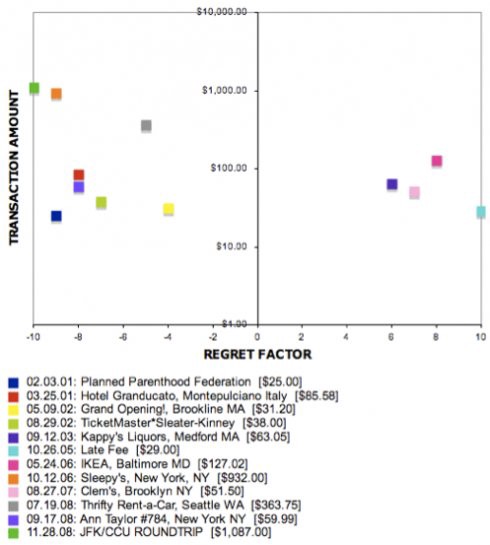
Jessanne Collins has written for Salon, Radar, The New York Observer, and The Morning News.
The End of the 00s: Bad for Humanity, but Great for Horror, by Melissa Lafsky
by The End of the 00s

I’m skeptical about this whole “decade from hell” business. I mean, just because financial karma finally arrived to kick the U.S. in its bulbous consumer-driven ass, that means the entire decade is somehow linked to Satan? The last four months of 2001 were from hell-that’s certainly true. And the entire summer of 2009 (when hell’s photogenic spawn ruled the media with her red heels). But seems to me this ten-year span should have been dubbed “The Decade We’ve Been Setting Ourselves Up For During the Three Previous Decades, and Now We Act All Shocked That We’re Broke and the Rest of the Developed World Wants to Lob a Shoe Up Our Ass.” Anyway, fuck politics-let’s talk about horror movies.
Yes, the oughts or the zeros or whateverthehellthisdecadeiscalled admittedly had their share of real-life horrors. But it was actually a pretty good decade for horror movies. The thing about horror is, while on the one hand it slaps us in the face with brutal realities like death and evil and penis-smashing, on the other hand it offers a useful window into what’s happening in society. Horror movies have long been great barometers for current cultural attitudes-back in the day, it was the moral code of Halloween and Friday the 13th exposing our Puritan origins (teens who do drugs and have sex must die by asphyxiation with a pitchfork). This decade, we had our collective desire to punish the rich and naughty-not to mention our obsession with torture-espoused in the Saw series (the social significance and gouge-your-eyes-with-a-screwdriver awfulness of which we’ve discussed before). Meanwhile, our cultural hard-on for “reality” onscreen was mirrored by the slew of “recovered footage” films- some of which were even good.
There was also the constant string of ’70s remakes, in the old Hollywood tradition of “Shit, we’ve got nothing original, so let’s just start cranking out retreads of stuff that did well a generation ago.” Still, it was an interesting time to drudge up all these thirty-year-old films, many of which set the standard for what horror movies could do onscreen. Remaking them now offers a pat cultural contrast-in 1977, when The Hills Have Eyes was first released, audiences were repulsed by the scene where a young mother is shot to death. Nowadays the sequence packs far less of a wallop, considering we read about that shit on our Google reader every day.
A few directors had breakout decades, and did some innovative things-yes, I’m talking about Rob Zombie and Eli Roth. Though this carnage-soaked duo doesn’t hoard all the credit-Neil Marshall gets estrogen-laden props for The Descent, and Greg Mclean did some truly medieval shit in Wolf Creek. But the box office grosses of all the Roth/Zombie torturefests combined still wouldn’t equal the cash pulled in by a Saw sequel on opening weekend. Which means the Get Rich From Gore trophy goes to a little Asian man from Melbourne. (I composed an entire ode to James Wan at one point, but it’s too embarrassing to print, even for me.)
Also, you can’t talk about the last decade of horror without talking about women. (Ok let me rephrase-I can’t talk about the last decade of horror without talking about women.) The 2000s may have ended with the near-decapitation of feminism (yes, Twilight, we’re looking at you) but the decade really did bring girl-violence to a level that would make any Dworkin acolyte proud. It started with Ginger Snaps, the first (and best, by far ) film about unleashing the raging beast inside every teenage girl. The fact that it spawned two shitty sequels can only be interpreted as success. The rest of the aughts brought an onscreen evolution for female characters, from “The Final Girl Who Shrieks and Flails” to “The Girl Who Will Sling a Tire Iron Through Your Pancreas.” All over the place, girls were showing up as aggressors-The Ring, High Tension, Hard Candy, Audition, The Devil’s Rejects, and of course The Descent, which finally gave women their well-deserved Lord of the Flies treatment (British schoolboys aren’t the only ones who’ll off each other if driven to the brink).
Granted, all these Chicks-With-Chainsaws films had to work to counteract Roth’s fecal cauldron of Asian schoolgirls getting their eyeballs yanked out and D-list starlets having their faces cleaved by power saws (Eli, for Adonai’s sake, get some therapy and drop the mother issues). But still, it’s a good start. Just think where we’ll be 10 years from now-maybe watching an emotionally bruised wife punish her husband by smashing his genitals and boring a hole in his leg. Oh wait, that’s right. Who says Lars Von Trier isn’t innovative?
Melissa Lafsky regrets nothing!
The End of the 00s: The Hollywood Crowd, by Ken Wheaton
by The End of the 00s
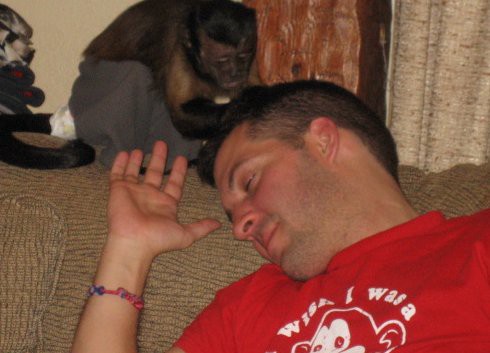
The year was 2007. Broken-hearted after the New Orleans Saints lost to Chicago in the NFC Championship game, I flew out to Los Angeles to hang out with my best friend from college, Doug. Doug was doing grad work in marine biology at USC. A smart guy, even if he was from Jersey. But even more impressive than his brains and his fancy science trips to Antarctica and his ability to laugh off my global-warming denialism without slapping me, were his drinking and football-watching skills. Also, for a sciency, white-trash sort from New Jersey, he ran with a Hollywood crowd.
At any rate, we went out into the hills east of Los Angeles to the home of one of Doug’s friends, where we set up a projection TV system and a white sheet — all the better to throw things at the screen should the hated Bears win the game. We drank and drank some more. At half time, we watched Aqua Teen Hunger Force. I think. The Colts won.
Oh, and a monkey slapped me.
Now, when I said Doug ran with a Hollywood crowd, I didn’t mean THE Hollywood crowd, but a Hollywood crowd. Namely, a Hollywood crowd that trained animals and stunt animals. Including Crystal, the monkey who played “Dexter” in “A Night at the Museum.”
Though I’d heard she could be irate and jealous (especially around women), Crystal seemed a cool monkey to me. Wore little monkey pants. Picked at my scalp. Sat on my shoulder. Undoubtedly, she was super impressed with my T-shirt that read, “I Wish I Were a Monkey. That Way I Could Fling My Poop at You.”
But when I put my hand out in a high-five fashion (what else do you do with a monkey, anyway), she smacked me.
Turns out the flat-out palm was the signal they’d taught her to slap Ben Stiller during the making of the movie.
There is a lesson in this somewhere, but I had so much to drink that night, I couldn’t tell you what that lesson is. And it wasn’t nearly as meaningful as the day I got married or when I found out my first novel would be published. But really, wasn’t this decade all about how you’d rather read about someone getting slapped by a monkey?
Ken Wheaton’s first novel, The First Annual Grand Prairie Rabbit Festival (Kensington) will be released at the end of the month. He earns a living wage as an assistant managing editor at Advertising Age magazine.
The End of the 00s: The Ballad of That Guy From Titus Andronicus (As Told To Matthew Perpetua)
by The End of the 00s
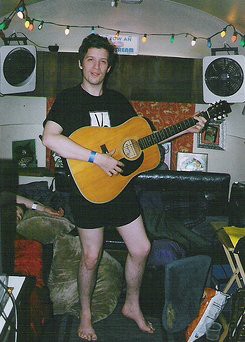
My band, Titus Andronicus, has played a lot of shows since I last blogged about a gig back in late 2009, and if I’m being honest with you, a lot of them have not been fun. It seemed harmless at the time, but I now realize that it was a big mistake to agree to only play Weezer songs at that horrible Vice Halloween party last year. That set a bad precedent. I don’t want to admit to how many private shows we’ve played throughout 2010 where we had to do other people’s music instead of our own, but I’m grateful that very little evidence has surfaced online. I suppose that by mentioning this here it only gives people an excuse to go looking for it. That’s the price of honesty.
Anyway, I don’t understand how the word got out that we could be hired to play whatever by request, but we had some good offers and couldn’t turn down the cash. The weird thing though is that we kinda suck as a cover band, so it’s hard to fathom why people would want to hire us instead of people who do this sort of thing competently on a regular basis unless they just wanted to humiliate us or something. Like, “Hey, here’s some Pitchfork band, let’s laugh at them by making them play Stone Temple Pilots songs instead of their own shit.” I don’t know. Maybe I’m paranoid about this, but it really does feel like people are trying to bring us low by forcing us into these situations.
I should say that not all of these experiences have been painful. We played some rich girl on Long Island’s birthday party, and that was okay enough. At least we had some freedom there — they asked us to play some “’80s music” but nothing specific. As it turns out, it’s pretty fun to play “If This It It” by Huey Lewis. I guess I shouldn’t be too shocked about that. People at that party seemed indifferent to us and were occasionally a bit rude, but at least there was no violence involved, and it wasn’t as tedious as that time we were paid to play “Tubthumping” by Chumbawumba a dozen times in a row for a room full of insurance dudes. It’s kinda fucked up, but after what came before and what came after that night, I’m at the point where not getting punched at a gig is enough to put it in the win column.
I’m beating around the bush, so let’s get straight to it. As you may have read on Pitchfork, Stereogum, and some other music blogs, my band performed at the 11th annual Gathering of the Juggalos festival at a place called Cave-In-Rock, Illinois. If you don’t know, Juggalos are fans of the Insane Clown Posse, who are…. well, insane clowns who rap. They’ve got a whole subculture going on, mostly in the midwest, and the people are like rednecks in Hot Topic gear crossed with what people used to call “wiggers.” I’d never heard about any of this before we got the offer a few months before the gig. We looked into it, and were kinda weirded out, but it seemed like it could be a funny experience, and even if it sucked, it was still $10,000 for a 40 minute set. I have to emphasize: We are all broke and can’t turn down that kind of money.
It was kind of a pain in the ass to get to Cave-In-Rock. We had to fly in to Indianapolis, and then drive five hours out to the location of the festival. We knew to expect some craziness, but I don’t think we were actually ready for the vibe of this place. It suddenly made sense why these guys were all about the cheap soda — it was like walking around in some kind of Mountain Dew commercial fever dream. But yeah, those first couple hours of showing up and taking it all in was the high point. You may have heard about there being magicians and dudes on stilts, things like that? I saw that in person, and frankly, that stuff cannot be denied. A+ on the stilt guys, all the way. Also, I have to say, the guys putting on the show, the people backstage — they were pretty okay. I’m not going to say it was the nicest experience we’ve ever had backstage, but it wasn’t the worst by any stretch. They didn’t give us any shit, and hooked us up with free hamburgers and soda. But seriously, it was all downhill from there on out.
We were not the only indie-type band to get booked for the show. At first it seemed like they were maybe trying to cynically broaden their audience, or maybe they just earnestly liked some of this music, or I dunno, they appreciated other musicians who carved their own path outside of the corporate mainstream. I’m pretty convinced now that they just wanted fresh meat to throw to these “Juggalos,” who are just so fucking vicious and cruel. They basically just show up to heckle any band that’s not ICP. I saw some footage from a year or so back of these people giving Andrew W.K. a hard time, but man, I think these people got more bloodthirsty over time, like it’s become a tradition. You know how you’d get these macho thugs coming to hardcore shows just to beat on people in mosh pits? It’s like that, but less focused, and more obviously directed at the people on stage. To make matters worse, this was another gig where we were required to play someone else’s music, and the request was very specific: We had to perform Kris Kross’ Totally Krossed Out in full. No, I’m not kidding.
Look, we take our job seriously. We spent two weeks learning and rehearsing this album, and you know, it wasn’t easy figuring out how to play this early ’90s hip hop as a rock band. We had to be clever, and I had to learn the lyrics to an entire fucking rap record. I like rap fine, don’t get me wrong, but man, I am not someone who should ever be rapping. But there we were, 3 p.m. on a side stage in the middle of this bizarre manchild festival in the middle of nowhere, about to launch into “Jump.” The cruel thing about doing Totally Krossed Out is that you have to play the big hit first, and then you have to keep going through all these album tracks no one is going to recognize, but we were contractually obliged to perform. I’m going to be so bold as to say that we kiiiinda had these people on our side for “Jump,” but by the time we were halfway through butchering “Lil’ Boys In Da Hood,” we were doing everything we could to avoid getting hit by all the shit being hurtled at us by this small legion of creeps. (I wish I wasn’t being literal, but I’m pretty sure some actual fecal matter ended up on Eric’s drum head.)
Anyway, anyone who was in front of the stage was there entirely to make us feel awful and unwelcome. Everyone else was off stuffing their faces with junk food or watching wrestling matches or stand-up comedy or waiting in line for a helicopter ride. These were the most committed haters on the face of the earth.
Yeah, there were helicopter rides. They had them at the festival last year too, and it was a big deal. Everyone was really into it, so they went a little further and got these old-timey locomotives and set up tracks all around the festival site. It would have been kinda cute, but of course, this is set up for the largest congregation of dumbasses in world history, and so everything went fucking haywire. For one thing, these idiots would not get off the tracks. They’d just wander on to the tracks and hang out there and shout at the oncoming trains, who had to stop to keep from running these guys over. But you know, the dudes running the trains were no better, and I think some people actually got run down. I wasn’t there when this happened, but I guess near the end of our set, this pack of drunk goons decided to derail one of the trains, and don’t ask me how, but they managed to do it. I heard an explosion. There were people running, people screaming. Our stage caught on fire-again, don’t ask me how. It’s all this horrible nightmare blur in my mind.
I remember certain images, but I think we were all in some kind of primal survival-driven fugue state. The things that stick out in my memory are so weird I can’t believe they happened, but it’s like, I know it happened, I can’t un-see it. For example, when I was fleeing from the burning stage, I saw this big fat guy throw what I believe was a goat at one of those dudes on stilts, and he just toppled over on to this upended railroad spike. So fucking gory, man. I definitely remember seeing two of the Vivian Girls running by with bologna slices stuck to their bare skin, and Andrew Bird getting kicked in the stomach by some kid riding by on one of those mini four-wheelers. You’ve probably already read about this in the news, I don’t need to tell you everything. It was a tremendously fucked-up scene. I probably wouldn’t be alive today if Will Oldham hadn’t rescued myself and Antony and shepherded us to safety on a John Deere tractor. I swear, the only thing that kept me sane in that moment was trying to get that Faygo-bottle ball gag out of poor Antony’s mouth.
I’m glad to have blacked out the worst of it. I remember the heat and noise of the explosions, but I have no visual memory of when that helicopter that got commandeered by some Juggalos on PCP crashed into Panda Bear’s stage, or how the “flesh heap” out by the barbecue area caught on fire. (I don’t think it was a connected chain of events.) I should be grateful that my entire band made it out of there, and none of us managed to get any significant injuries. We got paid enough that losing all our instruments and equipment wasn’t such a big deal.
When it comes down to it, as scary as this stuff was, it was still better than working some day job. This time last year I was pissed off about shady security at a VICE party, and now that just seems quaint after an event that may as well have been called “Altamont X-Treme.” My faith in having a “career” in music is rattled, but I don’t want to lose track of the positive things by dwelling on all of this trauma. After all, attendance was pretty good for our club tour in support of our second album, we got a few good reviews online, and one of our songs was #4 on the Hype Machine. That’s got to count for something, right?
Sincerely,
That Guy from Titus Andronicus
Matthew Perpetua is the proprietor of Fluxblog.
The End of the 00s: Ten Years of Best Picture Suck, by Zachary Woolfe
by The End of the 00s
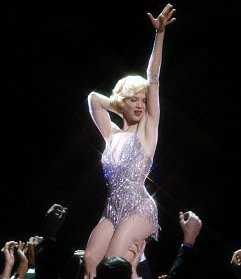
There was no tragedy this past decade greater than the utter implosion of quality among the winners of the Academy Award for Best Picture.
Some might point to the 90s as the time our troubles began, and I admit that Dances with Wolves and Forrest Gump were bad omens. (The 90s did end with the intolerable American Beauty!) But you also had Silence of the Lambs! Shakespeare in Love! And, OK, Schindler’s List, in all its retardedly black-and-white-and-oh-my-God-her-dress-is-red glory! There were glimmers of light, is what I’m saying; yes, 2007, sure;and that light of hope is shows what was missing in the awful aughts. Let me show you.
2000: Gladiator
Gladiator is a long, boring piece of shit, and that hyperstylized slo-mo thing-you know, like that 300 nonsense?- is nails on a chalkboard but for the EYES instead of the EARS.
2001: A Beautiful Mind
I guess A Beautiful Mind might have made some weird consolatory sense just after 9/11. (Those scary guys trying to get you? They’re just figments of your imagination!) But there’s really just a lot of Russell Crowe squinting his eyes and looking very, very frustrated, and Jennifer Connelly looking drugged and sad. Ugh, remember when Russell Crowe starred in two Best Pictures in a row?!?! That’s the 00s for you!
2002: Chicago
It’s really stupid to cast a lead in a musical who can’t sing. And then it’s even stupider to make this lack of talent into a signifier of her “vulnerability.” It didn’t work in Lawrence High School’s 1995 production of Hello Dolly, and it didn’t work for Renee Zellweger.
2003: The Lord of the Rings: The Return of the King
American cinema’s rise and fall, in one fact: The only two trilogies to have all three films nominated for Best Picture are The Godfather and The Lord of the Rings. Sweet Jesus.
2004: Million Dollar Baby
These three could do their performances in their sleep: Morgan Freeman in his treasured magical-Negro mode, Clint Eastwood as the grizzled, secretly kindly one, Hilary Swank as the quasi-lesbian. And then she gets paralyzed and makes him kill her, in a twist so cloying that it makes Terms of Endearment seem like Funny Games. This movie is for 55-year-old men what Something’s Gotta Give is for 55-year-old women.
2005: Crash
Crash is one of the worst movies ever made, and the fact that it won the Oscar for Best Picture says something-I don’t know what-about our world. Actually, I do know what! It says that we are so scarred by globalization and atomization and Internetization and whatever that we just want narratives in which all these unrelated people and stories are “woven” (i.e., thrown) together in one big redemptive bundle and we can UNDERSTAND IT ALL.
2006: The Departed
THIS is what Martin Scorsese finally wins for?! Not for any of his legendary masterpieces, but for a watchable, unremarkable genre movie? And you know what, there was something way off about the plotting!
2007: No Country for Old Men
I phased out at the end cause I thought it was JUST ONE MORE CRYPTIC MONOLOGUE and then the movie was over and I feel like I missed the point. Or was there not a point? Also, everyone said that Javier Bardem and his air hose were scary, but I didn’t think they were scary.
2008: Slumdog Millionaire
SO GREAT…. that we can feel okay about poverty in India because wait! Poverty actually is not poverty at all, but in reality an intricately designed preparation to succeed at American-style capitalism. Fuck this crazyass Horatio Alger shit. “But it’s a FANTASY!” Right, and what we totally needed are more fantasies about how being desperately poor sets you up to win a lot of money!
Thanks, Oscars. I really do hope Up in the Air wins this year. That would be the rancid icing on a moldy ol’ 00 cake.
Zachary Woolfe has had it with your movies.
The End of the 00s: A Party In Iran, by Kaila Hale-Stern
by The End of the 00s

Hadi is showing me pictures from epic-looking parties. Men and women dance, their bodies caught in ecstatic pause. The women are, for the most part, rather scantily clad: microscopic skirts dominate, and belly shirts that show a good deal of taut belly. Their faces are masterworks of make-up art: streaks of vibrant color rising to the eyebrow, glitter and blush and outlined lips. They move, the partiers, with abandon, heads tipped back, preening and laughing. The pictures are from Iran.
We were sitting in Prague, in mid-May 2009, before the fraudulent re-election of Mahmoud Ahmadinejad. This is weeks before newswhores like me could expound upon the legitimacy of the Guardian Council and pontificate about Khamenei, before hundreds of thousands pushed into the streets and were pushed back. The human seas of opposition supporters in Mousavi green and the videoed murder of Neda Agha-Soltan surely stand with the defining iconography of our decade.
In May, my knowledge of Iran was as sorely limited as many Americans: I knew some of our sordid dealings in the Cold War decades ago; I knew about Jimmy Carter and Ronald Reagan and had watched the ’81 run from our beleaguered embassy in class. I knew that we were supposed to boo and hiss the crass Ahmadinejad, but I was also trusting in our new President’s overtures of diplomacy to smooth the relations that Bush had mangled.
I had read Marjane Satrapi’s graphic novel Persepolis and thus felt qualified to comment that the current social status of women in Iran had been a modern and ruthlessly enforced invention. Since the 1979 revolution under Sharia law women had been dictated a strict dress code. The religious “morality” police in Iran were given the power to punish for improper hijab.
So I sat staring slack-jawed as Hadi clicked through his album. I had consumed, perhaps, one too many fine Czech beers, and my brain was slow that night. “But… don’t they… burqas?” I managed, watching bold women go past on the screen.
America often likes to portray itself as superior to extreme Islamic states in its treatment of women. Never mind that our lack of head-to-toe covering can promote whole other systems of body-bound repression-that’s a subject for Jezebel. We’re still a nation grappling with the fallout from a Superbowl nipple-flash.
But in demonizing Iran, or justifying bombing out the Taliban while not blinking at the civilians underfoot, Western politicians and talking heads love to jab fingers at huddled women in black, zooming in on what we imagine to be plaintive eyes peering out.
Along the way I must have swallowed that constructed image. A burqa meant a burqa, and somehow free-thinking dissent would be lost under cloth. I had not really considered that for many-for the old guard who had lived in a more female-empowered Iran, for the young, who are as wont to want to party as their counterparts across the planet-it could all just be a cover.
Hadi laughed at me, at my packaged TV-news knowledge. “Sure,” he said of the burqa. “They wear it. They wear it on the street to the party. And when they are inside the house”-he mimed tugging his shirt up-”They take it off; and they are wearing that underneath.”
Glitter and painted eye-arches and glowing lengths of skin. Laughter and dancing. Young and not-so-young people in the night’s heat, matching our slinkiest club attire, maybe even wearing less than we would. Seeming to care about it less. I sat staring and thought: we still have very little understanding of each other, despite the decade’s stunning advances in the accessibility of information.
For many in Iran, access to information became a precious necessity last summer, a means to survival and a way of bearing witness. The internet was purposely crippled in the election aftermath, and SMSing shut down entirely. The harsh crackdown on reporters and media presence that followed was unprecedented in its scope-the Iranian government would even blame the BBC for plotting coups and inciting violence.
But around the world, people were still watching, and information kept leaking through from Iran. Bloggers tracked the election protests obsessively. Twitter and Facebook icons turned Mousavi green. Companies (and governments) stepped in to keep their software accessible. Computer experts worked to make safe pages and portals for the protesters to use.
Agha-Soltan, a student who had stopped to watch the protests, was shot by a Basij militia bullet and would go on to die millions of times online and in cell phone videos and on TV, our first digitalized martyr and an instant symbol of the protest movement and the reigning regime’s brutality.
Lay people like me learned fast about the history of Iran, its tangle of politics and religion. And the need for real honest-to-God, on-the-ground reporters has never been more soundly demonstrated. When only a corrupt government’s state-run media gets to report to the people, George Orwell wins and everyone else loses.
Americans believe they should have the luxury of picking and choosing what they want to know, of leaving on only the channel that says what you want to hear. These days we seem to collectively thrive on a mix of navel-gazing outrage, scandal and denial, hopping from one to the other with hysterical frequency aided by the 24-hour news cycle and the web. While our Nobel Peace Prize-winning President surges forth with an unwanted war in Afghanistan, imperiled newspapers keep a certain celebrity golfer on their front page for what’s now weeks in the running. This is the state of America as we bring the first decade of the new millennium to a close.
Doesn’t it seem like what we want to know is not a lot? On
The Daily Show last summer, Jason Jones’ tongue-in-cheek but masterfully painful segment “Jihad Walking” put questions to Iranians-who could name American presidents, locations and the branches of our government-while Americans similarly quizzed in Times Square could often not bring forth the name of a single Iranian city, or even the name of the country.
It demonstrated a very willful ignorance. As that sage Alan Jackson once sang: “I watch CNN but I’m not sure I can tell you / the difference in Iraq and Iran.”
We were in Prague, and Hadi, from Kuwait, had come away from elections there. In Kuwait, he told me, his party had just worked to successfully elect three women to parliamentary office. This was against the express advice of the hard-line imams, who cited eternal damnation for the offense of voting for any of them. He couldn’t stop smiling over the victory.
Hadi told me that the parties amongst Iran’s revelers were some of the best he’s ever been to. They favored tequila. He told me he can’t wait to go back. In the pictures, his friends hefted bottles and danced and moved close together, making Facebook faces.
For a short period of time in June 2009, the newsmedia gave its attention to a worthy cause, and the internet finally proved itself to be useful. Iran’s protest movement may be written about as the goddamned “Twitter Revolution” in history Kindles, but it was the first avidly viewed by curious and participatory audiences tuning in around the world.
And it established more than ever the need for the accessibility of uncensored information, which should now be considered a basic right. The quelled uprising in Iran represented a call for freedom and reform the likes of which we should be ashamed we could not replicate here in America during our own electoral problems.
In the 00s, we changed our online avatars to show solidarity with admired revolutionaries. Maybe we will do more. The future of peace and conflict is irretrievably linked now to our ability to talk to each other and show our truths.
Kaila Hale-Stern lives in a self-selected corner of the internet populated by basement-dwelling anarchists and people who write stories about their favorite fictional characters. Her primary concerns are the duplicities of history, the scourge of pop culture, and not letting Mayor Bloomberg win the battle against cigarettes. She can be read here and reached here.
The End of the 00s: The Coup, by Eric Spiegelman
by The End of the 00s
I found a copy of the album with the original cover at Amoeba in San Francisco the following March and bought it for a friend as a birthday present.
He was a music buff, and knew the story, how the artwork was created over the summer and the album was set to be released the third or so week of September. How the record label, in a rather obvious corporate decision, recalled all the already-shipped boxes that were sitting in the back rooms of record stores, waiting for the official release date.
We both explained it to everyone else at the birthday dinner. For a moment, it was like, hey, interesting oddball artifact, you sick fuck, etc.
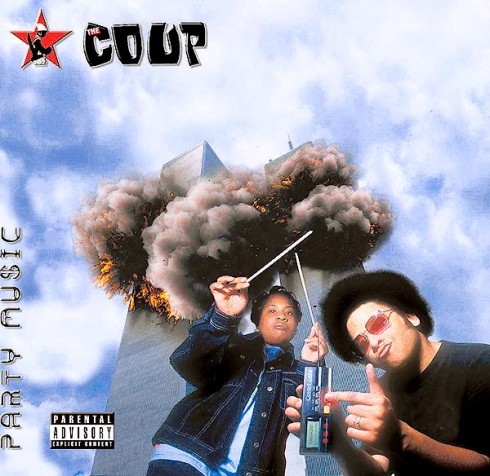
And then it wasn’t that. There was quiet, and everyone stared at the thing like it came through a wormhole, as if the impact of September 11th was so strong that it rippled back in time and someone remembered it in advance. This was an uncanny moment.
Eric Spiegelman produces the web show Old Jews Telling Jokes, and he’s got both a Tumblr and a Twitter. The best possible anagram of his name is “Imprecise Angel.”
The End of the 00s: What I Know Now, by Abe Sauer
by The End of the 00s

The Awl asked everyone (so I’m not special) to look back on the last decade and submit something, anything, of substance. I thought long and hard about this project and decided that, despite many impactful first-hand experiences such as 9/11, I should write about how over the last decade I matured to understand how little I understood in the decade before, how that mirrored how little I knew in the decade before that, and if the next decade will turn out to be the same and what that means about how much I think I know now. But then I got off the toilet and decided what I really think about when I look back on this last decade is something a little different….
I hope Joe Lieberman has a stroke.
The end.
Happy New Year! And below is a collection of progressively more embarrassing holiday pictures from my youth, to remind us all, during this season of reflection, to stay humble, if not sober, jolly or even content.
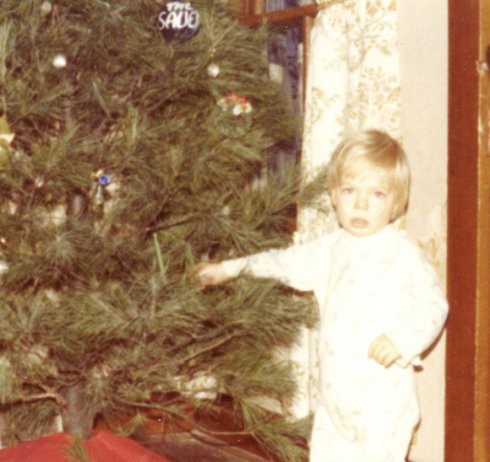
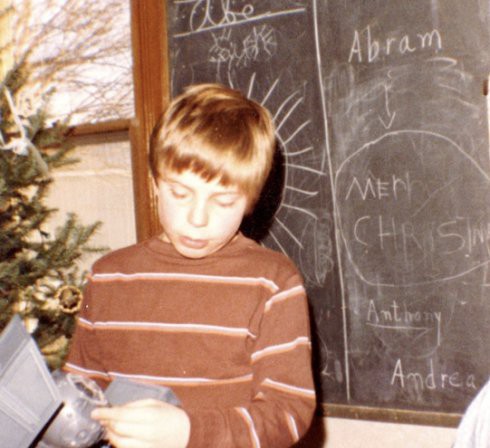
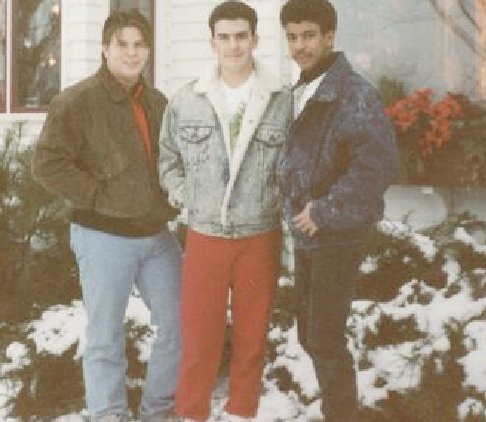
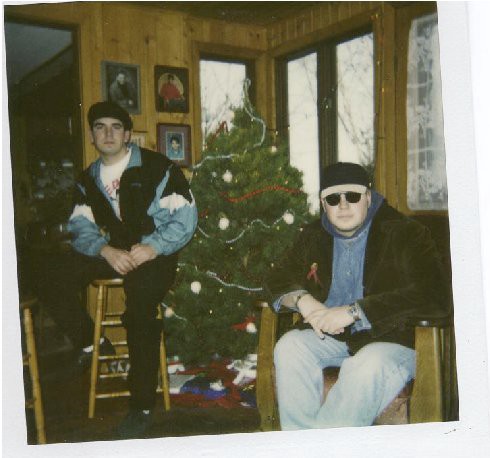
The End of the 00s: Augustine's Second Cat, by Julie Klausner
by The End of the 00s

I began the decade with a Kim’s Video membership and an unslakable thirst for documentaries about crazy people. I’d rent their only VHS of Chicken Hawk, a doc about NAMBLA members, that featured a particularly memorable monologue from a yellow turtleneck aficionado about something he called “gentle time.”
Crumb, my favorite movie at the time, was a then-rare example of what’s since become considerably more popular: documentaries about fascinating people who suffer from different strains of mental illness, chased with a bit of tidy white-text-on-black-background coda information about what’s happened to them since.
Crumb, with its slow burn reveals and its post-production update of (spoiler?) Charles Crumb’s suicide, became a linear alternative to the ol’ “turn the cameras on the characters, then walk away” method of 70’s gamechangers like Grey Gardens. And throughout the last decade, finding abnormal psychology-themed documentaries with a story arc and an update before the credits became cake. Movies about deteriorating families, madness streaked with genius, and zany kooks followed in Crumb’s big footsteps. And 2005’s Grizzly Man is still our nation’s most chilling reminder of what can happen to unhinged narcissists once they lose the part of “Woody the Bartender” to a totally different blond vegetarian.
Recently, TV began producing more and more docu-style programming starring people suffering from demons or addictions, and some bedazzled blithely with harmless quirks. And just in time for the now-defunct Mondo Kim’s space to become a karaoke place, I finally have a DSM IV-worthy cornucopia of bats characters to ogle; as an armchair shrink, a camp aficionado, and a hoarder of human personality quirks I haven’t seen before, from a safe distance.
This year alone, TLC aired “My Monkey Baby,” a special (would that it were a series!) about American families who live with capuchin monkeys they treat like children. HBO aired the exquisite and insane “Cat Dancers,” about a husband and wife circus act that eventually became a husband and wife and third guy they were both sleeping with act. It’s also about the albino tiger that caused tragedy for all three. And A&E;’s “Intervention” spun off a show this summer that elevated the white-text-on-black-background coda into high art-or at least high storytelling-while the subject matter brought viewers into the “deep cuts” section of ab-psych curiosity. Obviously, I’m talking about “Hoarders.” It is the show of the decade: our inevitable apex. More people watched this season’s premiere of “Hoarders,” in which a 68-year-old cat-lover from Louisiana named Augustine, than this season’s premiere of “Mad Men.” It was a doozy of a show.
Augustine, whose son came home from Washington state to help dig his mother out of the detritus that kept her company since he left home, was a remarkable “Hoarders” subject-not only because she didn’t immediately thank the workmen who found her missing false teeth under the mounds of garbage on her living room floor-but because the producers found not one of her dead pet cats, frozen in time after possibly being killed under the weight of Augustine’s own falling trash, but two. They found two dead cats. And when they found that second cat, it was as though we could all finally move on from the era of the kind of cringe-doc that we can trace back to Maysles, but lives specifically in the aughts as a thing that we found and made perfect. Maybe in retrospect, Grey Gardens was just “Hoarders” 1.0.
Anyway, the second cat. Do you know that song Jews sing on Passover, “Dayenu”? Hebrew for, “It would have been enough?” Come on, yes you do. Or text a Jewish person. Anyway, it’s about how great God is, and how if all He had done was rescue us from the desert, and etc., etc., it would have been enough. If all He had done was rescue us from the desert and take us to Israel… and so on. It’s like that “B.I.N.G.O.” song, only with a new Old Testament specific each verse instead of a hand clap.
So: If Augustine had found her bottom teeth and not her top ones.
…If there had been one cat’s corpse underneath the useless things and dirt she kept around her in hopes of filling the void of not having anybody in her life to talk to.
…If she were just another bra-less character from the Delta region with an oddly photogenic mental illness.
…If she weren’t merely a pawn in the latest installment of the “Intervention” franchises, only without the part where they ship you off to rehab and they interview you once you’re okay so people watching can feel like they’re not just marinating in schadenfreude but instead participating in some kind of redemptive process that helps people help themselves, as though that is what television is for or has ever been for, even though I guess in the long run that might be a better feeling to give yourself than the feeling that you’re just smugly laughing at how screwed up sick people can be, and so on and so forth, and “Hey Paula” too…
Dayenu.
Julie Klausner’s book, I Don’t Care About Your Band, comes out Groundhog Day 2010.
The End of the 00s: No One Would Have Blamed Her For Changing Her Mind, by Dan Shanoff
by The End of the 00s
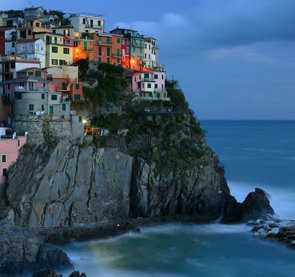
“How cheap is cheap?”
That was my instantaneous, inane response in the single most pivotal moment of my decade.
I was sitting in an internet cafe in Florence, Italy. It was early August 2001. I had been trading emails with a woman with whom I went on a blind date three weeks earlier. We had hit it off, but a few days later, I was jetting off for my first trip to Europe — three weeks of touring by myself.
I liked this woman enough that I was sending her emails from the road. A lot of “wish you were here” — and I sincerely believed it. Not unlike Don and Betty Draper’s Italian getaway, Europe was meant to be explored for the first time with someone with whom you had just had a couple of really good dates.
Halfway through the trip, I logged in and had an email from her: “How would you feel if I joined you in Italy?” it read. “I found a cheap flight.”
And my first reply:
“How cheap is cheap?”
Oy. No one would have blamed her for changing her mind immediately, based on that response. Instead, she replied “Does it matter?” Recognizing my appalling mistake, I said of course it didn’t. A day later, she was on a flight — yes, a cheap one — bound for Italy.
Looking back, we were both so glib about it — her with the offer, me with the acceptance. But we both felt like we had nothing to lose: She had never been to Italy; as she explained it later, if things didn’t go well… well, she was still in Italy. I missed her and wanted to share my traveling experience.
Here is what I was struck by at the terminal in that internet cafe: What guts she had. Consider the freak-out potential of so many guys in New York at such an offer. Consider that she still barely knew me — she couldn’t be sure how I would take it, let alone whether I was a decent traveling companion.
I accepted her offer not because I necessarily knew her, but because I wanted to know her — to know someone who would do something like that. To make your third date a trip to Italy to meet up for a few days, because you’ve never been… because it would be fun to be there with someone you’ve had two fun dates with already… because why not? It wasn’t that I said yes — rather, how could I say no?
And so she joined me. Four days traveling in Italy — Venice, Cinque Terre, Milan — with someone you have only been out with on two dates previously is the equivalent of 100 dates in New York. I believe that was the exchange rate at the time.
Because of that, when she left — I still had a week to go on my trip — I knew I would marry her. We had known each other for less than three weeks, but in addition to all of her wonderful qualities — some I could instantly recognize, some I could only discover with time — I wanted to marry the person who asks, after two dates, if they can fly across the world.
Two years later — which felt like twice as long, thanks to the emotionally accelerating effect of the Italy trip — I asked her to marry me. Eight years after that third date in Italy, we have two beautiful children. I can only hope they grow up to be as fearless as their mom was that day.
I spent nearly the entire decade with her and all of my decade’s most memorable moments — our wedding, our kids, even the best moments of my career — were made possible because of her.
At the core of why I love her is admiration for how she lives her life as a spouse, mom, lawyer and friend. And underlying all of that admiration is that lingering memory of how I felt at the moment she told me she found a cheap flight to join me in Italy.
How cheap is cheap? Thank God: Cheap enough.
Dan Shanoff is a Brooklyn-based writer and parent — that really narrows it down — and, for lack of a better phrase, “media industry consultant.” He spent his decade morphing from MBA student to national sports columnist to dad. He has a site of his own, but also devoted an absurd amount of time over the past six months editing a project dedicated to covering a single college football player.
